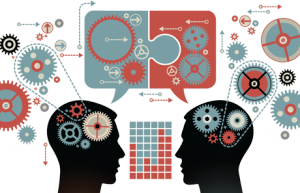The Nature of Organisational Psychology
What question does it answer?
How does the science of psychology apply to work and organizations?
How it Began
Organizational Psychology developed from Industrial Psychology as a field of inquiry which endeavours to understand how people working together in organizations. Since work is central to societal functioning, giving us both material benefits, identity, psychological well-being and a structure to our time and activity, organizational psychology necessitates an understanding of work as a fact of life.
The nature of work has changed as our society has evolved. Moving from basic subsistence to a modern understanding of work which seeks to be more meaningful to the individuals. Work and organizations are not fixed, they are socially constructed and they change and evolve alongside our society and cultural changes.
Key Terminology
Industrial Psychology – Testing, selection and Training applicable to industry
Employee Well Being – That part of an employee’s overall well-being that they perceive to be determined primarily by work and can be influenced by workplace interventions.
Organizational Effectiveness – how effective an organization is in achieving the outcomes the organization intends to produce
In Brief
The purpose of organizational psychology is to “understand the psychology of organizations and people, and to apply that basic psychological science to help people become more fulfilled and to help organizations become more effective.” (Kozlowski, 2012)
There are different approaches to Organizational Psychology which demonstrate the complexities and challenges of studying organizations and the behaviours that occurs within them.
Industrial and Organzational Psychology – Not an either or, but an and. Industrial and Organizational psychology represent domains of research and application that have evolved historically, focusing on areas such a human characteristics, behaviour and organizational performance.
Employee Wellbeing and Organizational Effectiveness – Applying psychological principles to improve the experience of workers and the effectiveness of the organization and how this work in tandem to improve organizational performance.
Basic and Applied Science – Developmental, Social or Neuroscience. The fields are vast but the goal is the same – to discover generalized principles of human behaviour that cut across a wide range of situations
Science and Practice – Explaining important phenomena through the development of meta-theories, systematic research, investigation, codification of knowledge and the development of tools – applied by practitioners in the workplace.
What does this Mean for Organization Development?
Organisation Development is a field of knowledge that concentrates on the development of organisation effectiveness, especially during change. It uses group and human dynamic processes from applied behavioural science methods, research and theories to facilitate movement of groups and organisations. This includes drawing from Organizational Psychology.
Organisation Development is based on research, including that from the field of organizational psychology, which demonstrates that every part of an organisation is integral to a system that relies on and impacts other elements of the internal and external environment in which the organisation operates. Key areas of research include (although this is not an exhaustive list);
- Human Characteristics and differences and their impact of individual/team/organizational functioning
- Assessment, tests and technology used in people activities; including employee performance assessment, job design, training, selection etc.
- Assessment of individual differences in abilities
- Organizational systems theory, Organizational Behaviour and change and effectiveness
- Leadership and Motivation
- Leveraging synergies across the micro and macro divide e.g. understanding how Organizational strategy shapes the needs of employees
- Human capital and its impact on strategy, capability and effectiveness
- Application of psychological principles on well-being e.g. impact of organizational restructuring and business reengineering, including stress and survival anxiety of employees
- Cognitive neuroscience and brain function – impact on decision making, mood and disorders
- Personality, attitudes, values and interpersonal interactions
- Motivation from achievement, power and renumeration
- Influences on leadership and group processes
- Behaviour outcomes on job performance, attitudes and other reactions
- Principles for understanding important classes of work bheaviour
- Tools to influence, shape and enhance human performance

